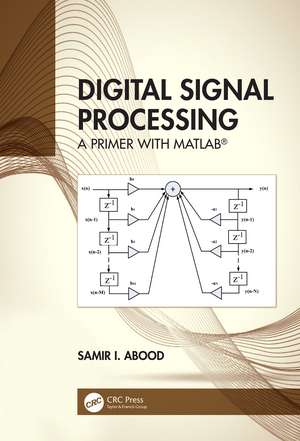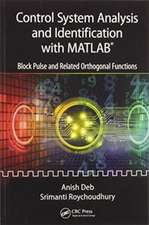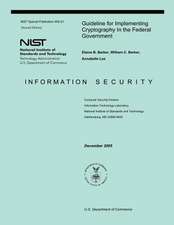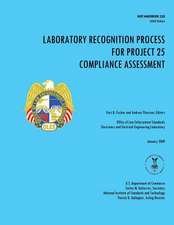Digital Signal Processing: A Primer With MATLAB®
Autor Samir I. Abooden Limba Engleză Hardback – 28 ian 2020
In recognition of requirements by the Accreditation Board for Engineering and Technology (ABET) on integrating computer tools, the use of MATLAB® is encouraged in a student-friendly manner. MATLAB is introduced in Appendix C and applied gradually throughout the book.
Each illustrative example is immediately followed by practice problems along with its answer. Students can follow the example step-by-step to solve the practice problems without flipping pages or looking at the end of the book for answers. These practice problems test students' comprehension and reinforce key concepts before moving onto the next section.
Toward the end of each chapter, the authors discuss some application aspects of the concepts covered in the chapter. The material covered in the chapter is applied to at least one or two practical problems. It helps students see how the concepts are used in real-life situations.
Also, thoroughly worked examples are given liberally at the end of every section. These examples give students a solid grasp of the solutions as well as the confidence to solve similar problems themselves. Some of hte problems are solved in two or three ways to facilitate a deeper understanding and comparison of different approaches.
Designed for a three-hour semester course, Digital Signal Processing:A Primer with MATLAB® is intended as a textbook for a senior-level undergraduate student in electrical and computer engineering. The prerequisites for a course based on this book are knowledge of standard mathematics, including calculus and complex numbers.
| Toate formatele și edițiile | Preț | Express |
|---|---|---|
| Paperback (1) | 329.43 lei 43-57 zile | |
| CRC Press – 13 iun 2022 | 329.43 lei 43-57 zile | |
| Hardback (1) | 770.26 lei 43-57 zile | |
| CRC Press – 28 ian 2020 | 770.26 lei 43-57 zile |
Preț: 770.26 lei
Preț vechi: 1030.96 lei
-25% Nou
Puncte Express: 1155
Preț estimativ în valută:
147.39€ • 154.28$ • 122.67£
147.39€ • 154.28$ • 122.67£
Carte tipărită la comandă
Livrare economică 31 martie-14 aprilie
Preluare comenzi: 021 569.72.76
Specificații
ISBN-13: 9780367444938
ISBN-10: 0367444933
Pagini: 338
Ilustrații: 233
Dimensiuni: 178 x 254 mm
Greutate: 0.79 kg
Ediția:1
Editura: CRC Press
Colecția CRC Press
ISBN-10: 0367444933
Pagini: 338
Ilustrații: 233
Dimensiuni: 178 x 254 mm
Greutate: 0.79 kg
Ediția:1
Editura: CRC Press
Colecția CRC Press
Public țintă
Academic and Professional Practice & DevelopmentCuprins
Continuous and Discrete Signals. Signal Properties. Convolution. Difference Equations. Discrete-Time Fourier Series (DTFS). Discrete Time Fourier Transform (DTFT). Discrete Fourier Transform (DFT). Fast Fourier Transform(FFT). Z-Transform. Z-Transform Applications in DSP. Pole-Zero Stability. Sampling. Digital Filters. Implementation of IIR. Implementation of FIR. Digital Filter Design. Appendix A: Complex Numbers. Appendix B: Mathematical Formulas. Appendix C: MATLAB.
Notă biografică
Samir I. Abood received his BSc and MSc from the University of Technology, Baghdad, Iraq in 1996 and 2001 respectively. From 1997 to 2001, he worked as an engineer at the same university. From 2001 to 2003, he was an assistant professor at the University of Baghdad and AL-Nahrain University, and from 2003 to 2016. Mr. Abood was an assistant professor at Middle Technical University / Baghdad – Iraq. Presently, he is doing his Ph.D. in the Electrical and Computer Engineering Department at Prairie View A & M University.
Descriere
This book provides an excellent cover of discrete-time signals and systems. All principles presented in a lucid, logical, step-by-step approach. As much as possible, the authors avoid wordiness and detail overload that could hide concepts and impede understanding.



























